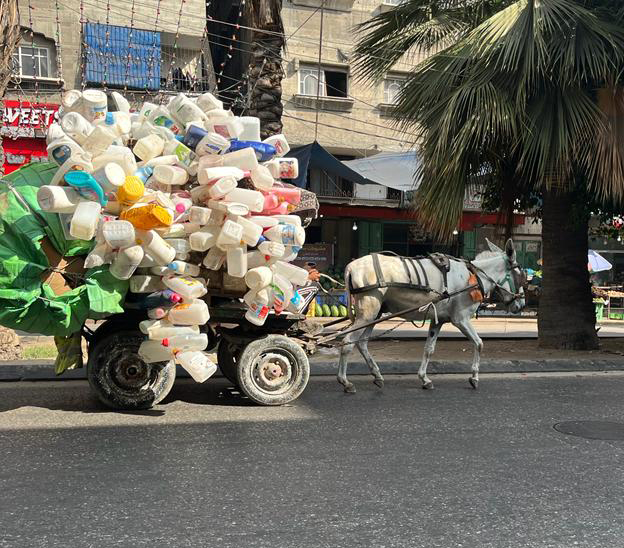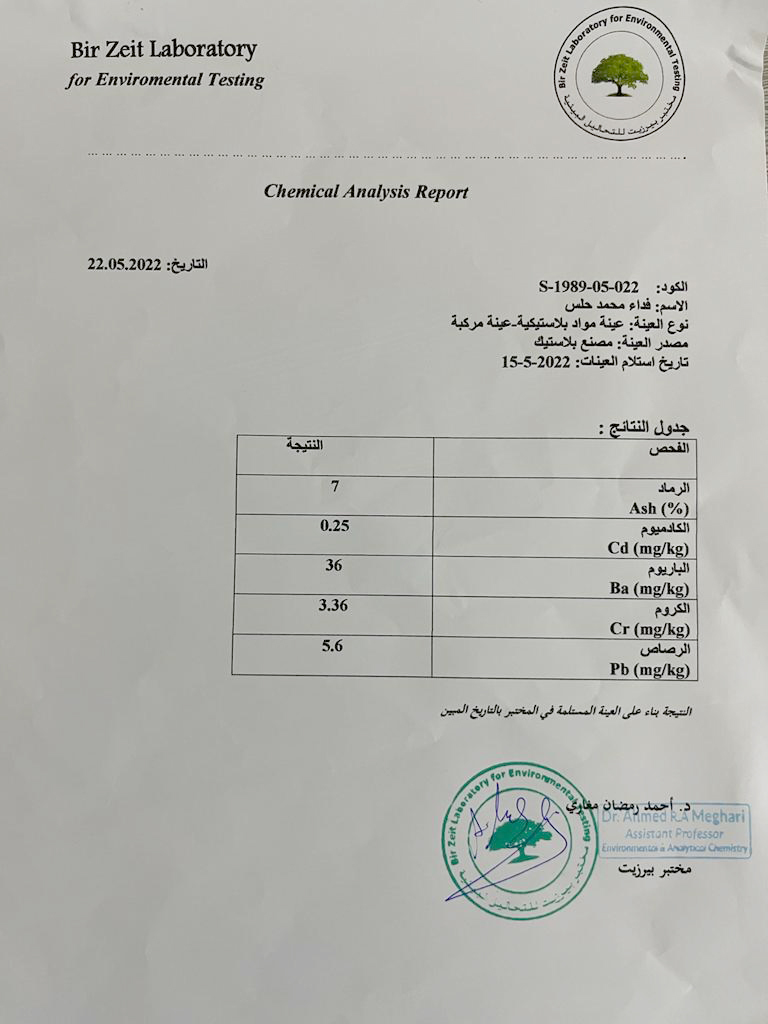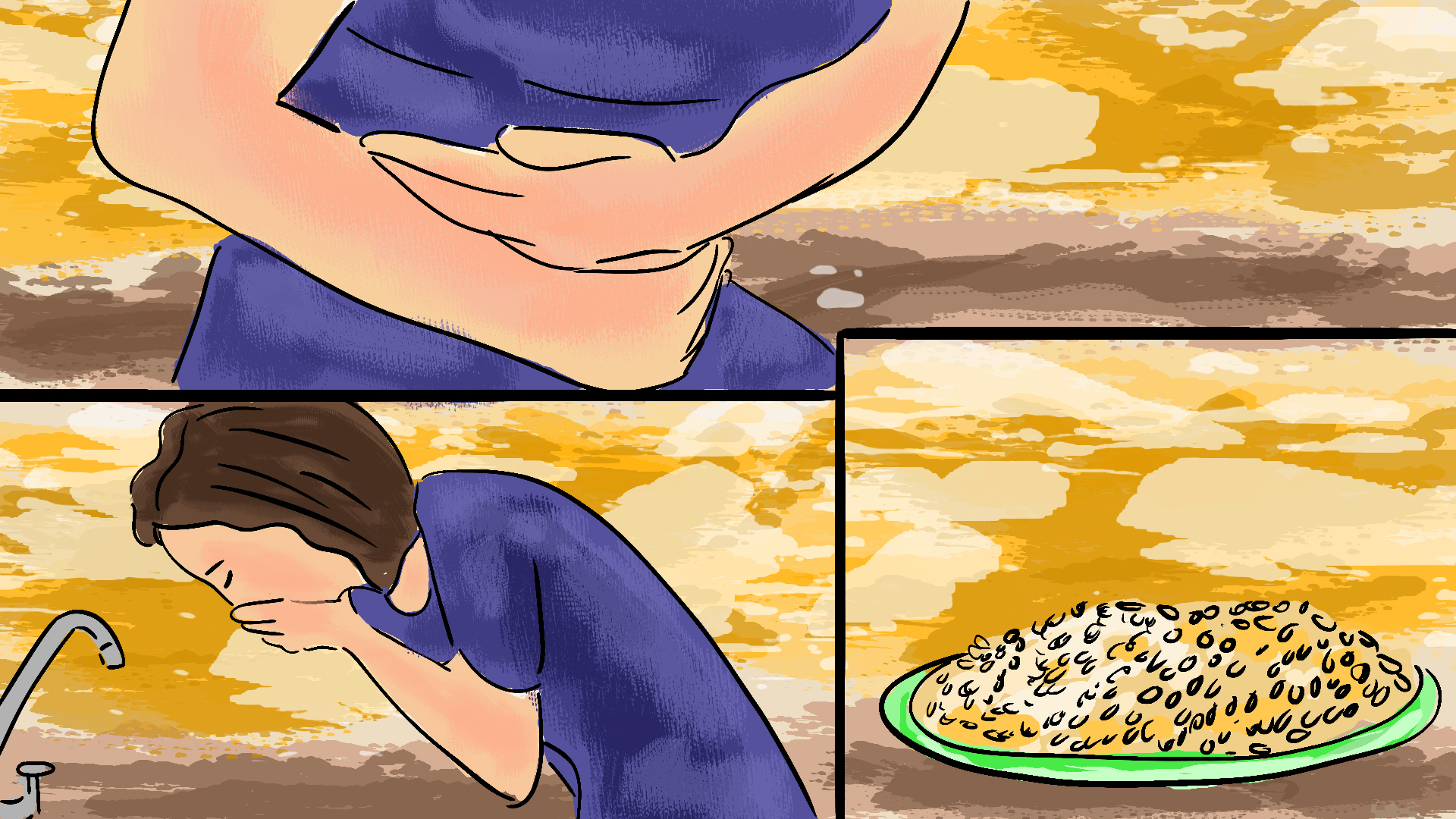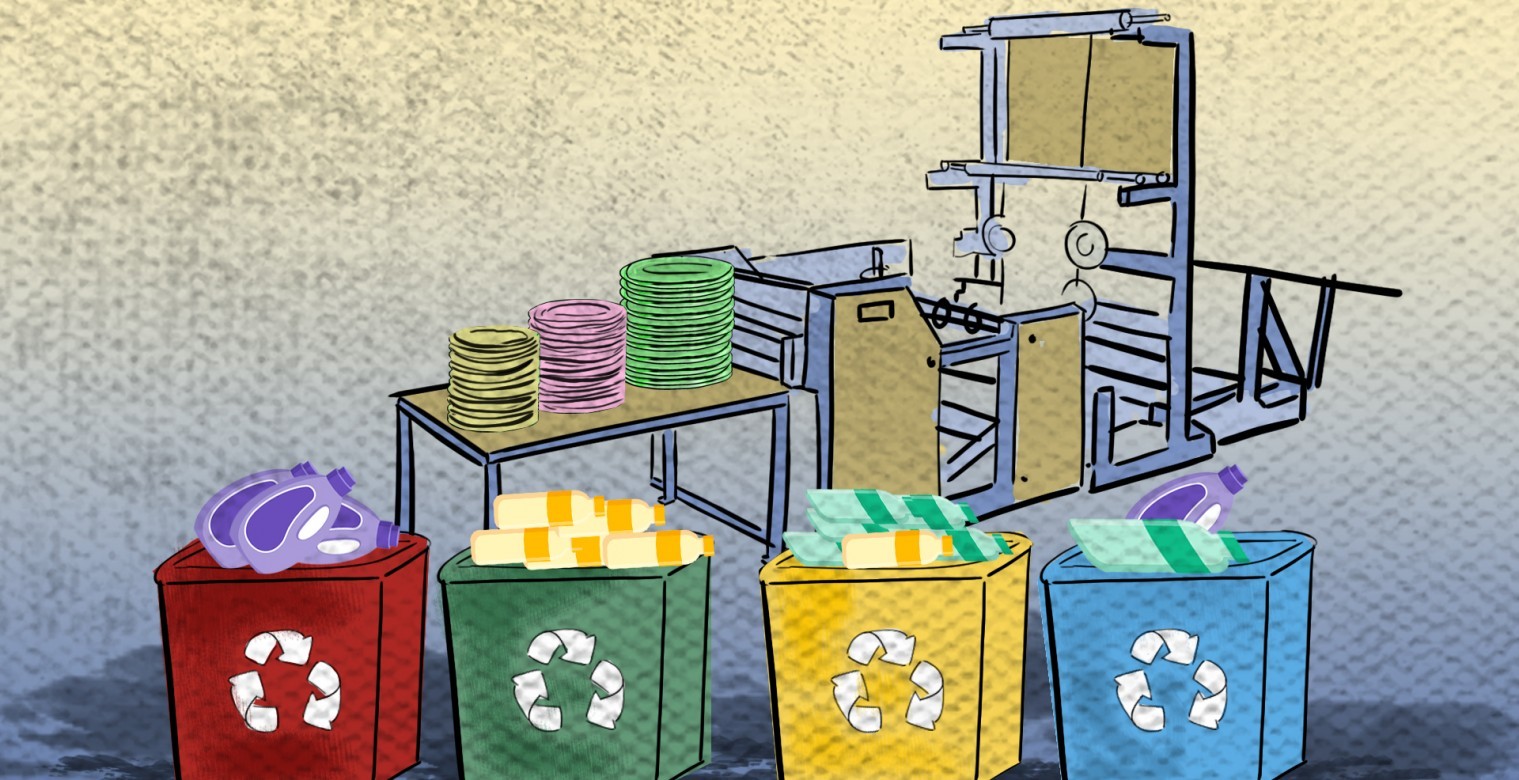Muhammad Salem (pseudonym), the owner of a kitchen in Gaza City, uses plastic trays along with other aluminum-coated trays to serve food.
Salem is unsure about the health safety of these plastic dishes, but he believes they are safe. However, according to specialists, if the plastic trays are made from plastic waste, they can be harmful to health.
Salem imports these utensils from one of the five plastic factories in the Gaza Strip, according to statistics from the Ministry of National Economy.
During a field visit by the "Last Story" team to a random sample of kitchens in the Gaza Strip (exact number unknown), it was found that most of them use plastic trays, even though their use is prohibited by the Ministry of Economy, particularly in rice kitchens or shawarma restaurants. The Ministry of Economy says it has been prosecuting those who use plastic trays since 2009.
This use of plastic utensils is not limited to kitchens or restaurants. Almost no home in the Gaza Strip, which is home to more than two million people, is free of plastic utensils or containers used to serve food or store vegetables in the refrigerator, including mesh boxes made from recycled petroleum materials. Consumers may not realize the danger to their health.
Recycling plastic in Gaza, estimated at 16 tonnes of daily waste, is seen as a step towards overcoming the blockade imposed on the Strip for more than 15 years.
Ahmed al-Manama, director of the solid waste department at the Ministry of Economy in Gaza, said that recycling has become an important aspect of industry and environment, especially since a large portion of the waste is buried in landfills. Reducing it daily will contribute to improving waste disposal.
However, there are also risks associated with reusing non-conforming materials that do not meet health specifications.

The third item of the instructions, related to the requirements applicable to materials and tools made from recycled plastic, states that it is forbidden to put on the market recycled plastic materials and tools that contain recycled plastic unless through a recycling process approved in accordance with these instructions.
The licensed recycling process must be managed by an appropriate quality assurance system that ensures that the recycled plastic meets the requirements of the license.
However, Imad al-Hourani, director of the Standards and Metrology Institution in the Gaza Strip, denied that any of the plastic factories in the Strip had obtained the "license" that entitles them to produce food-grade plastic from recycled materials.,
Al-Hourani explained that his institution does not constitute any censorship role on the manufacturing process, and is only entrusted with issuing technical instructions, saying: "We as an institution have issued technical instructions to be followed during the licensing process, and I believe no one holds a license in the sector."
In light of this, the "Last Story" began a tour of the plastic factories that manufacture food-grade materials to learn about their commitment to product safety from a health point of view. However, many of them refrained from speaking or allowing us into the factory.
The research led us to the markets, to see the utensils and containers used in food contact, and we found that most of them don't contain an indication indicating the danger of their use as shown in the picture.
Mohammed Kallab, director of the Industrial Control Department at the Ministry of National Economy in the Gaza Strip, said that a decision issued by his ministry more than 13 years ago prohibits restaurants and kitchens from dealing with trays made of recycled plastic, and no longer in local markets due to heavy censorship.
Kallab, who we met in his office in Gaza City, added that the factories that work on recycling plastic in the Gaza Strip five factories and are monitored, and have been obliged to put warning signs that prevent their use by citizens in preserving food because of its danger to their health.
In reality, however, this contradicts what we documented on video camera during the investigation, which conclusively proves that these plastic utensils continue to be produced from recycled plastic, and that many of them did not bear any indication of their potential danger.
Also, most of them don't adopt a label, according to the conditions set by the Standards and Metrology Organization, which is an identification card for the commodity containing the country of origin, importer, components used and date of production.
In a new attempt to enter the factories, we were accompanied by a group of inspectors from the Ministry of National Economy, and we were able to access one of them, located in the northern Gaza Strip, where production of plastic basins from recycled materials.
At this factory, which declined to disclose the amount of its daily output, we found that the plastic containers being manufactured had a label that read "Don't use for food", without an approved label, while we discovered that the mesh chains manufactured here didn't have labels.
This prompted the question: If none of the plastic utensils intended for food contact made from recycled materials are licensed, and don't guarantee a statement card or explanatory label, how do they operate under the supervision of the Ministry of National Economy?
Article (31) of the Palestinian Standards and Metrology Law No. 6 of 2000 includes a series of Penalty provisions starting with imprisonment and ending with a fine not exceeding 10,000 Jordanian dinars, or both, if any of the following acts are committed:
If the information is tampered with contained in the statement card with the intention of cheating - writing down the phrase 'conforming to the Palestinian specifications' or placing a mark of conformity on the statement card without obtaining the written consent of the Standards institution.
On the other hand, al-Hourani pointed out that no violation has been recorded against any manufacturer so far, without offering any explanation.
It is possible that these (cheap) utensils are used by low-income people in the Gaza Strip, who constitute the majority of the total population, especially since more than half of them live on humanitarian aid due to the blockade imposed on the Strip, and therefore this may make it likely that they will stay away from the acquisition of imported safe and hygienic kitchenware, due to their high price.
The package of imported plastic bottles (3 packages) is sold in the local market, worth 15 shekels, while recycled ones are sold for 8 shekels.
It may be easier for sellers of plastic utensils in the local market, especially baskets used to keep vegetables and fruits in the refrigerator, to remove labels that prevent their use in foodstuffs, due to a lack of proper oversight.
To this saying Kallab responds that the citizen is responsible for himself if he misuses these tools.
Asked how to differentiate between a healthy product and a recycled product from plastic waste, he said: "Any transparent product is made from new raw materials, and any dark colored plastic product is often a recycled product from plastic waste."
Also, he noted that the issue needs a national program to educate people about the dangers of plastic, he said.
In order to eliminate the doubt, the investigator obtained a sample of the plastic raw materials used in the manufacture of food serving utensils, and subjected them to analysis, and the results were 'shocking' according to the specialists.
Here are the results of the examination:

He then added, "The percentage of lead in the plastic used is more than a hundred times what is recommended by international organizations, and this is catastrophic. These products are petrochemical products that break down and don't dissolve, meaning that when exposed to hot foods, they break down and become small atoms mixed with food and are harmful to human health."
Hiles continued that there are foreign studies that show the material numbers of the heavy elements that were examined in the sample and the extent of their match, which are inspired by American and British standards for drinking and food utensils, as they came a hundred times what international organizations recommend.
He pointed out that the figures in this form used in the production of plastic used in cooking utensils or containers for transporting and storing water and others are catastrophic, alarming and very dangerous.
At the same time, he mentioned that plastic is also affected by salty foods as well as foods that contain acids such as pickles, citric acid and pepper, which will naturally analyze and breaks down plastic.
As a result, Hiles stressed the need for strict measures and laws to regulate the use of plastic and rein in violators.
As for the laws, they clearly criminalize this act, the Public Health Law No. 20 of 2004, in its article No. 20, in the third item, explicitly indicate that a food product becomes harmful to human health if its packaging contains harmful substances.
Lawyer Abdullah Sharshara stresses that, the Palestinian legal system is based on a set of laws that achieve a general goal of protecting public health, the most important of which are the Public Health Law, the Penal Code and the Consumer Protection Law.
The Public Health Law entrusted the Ministry of Health with the task of maintaining food safety, he said, as the fourth chapter of this law stipulates that every person who manufactures foodstuffs must provide the ministry with the quantity of chemicals contained in food, in addition to the method of packaging, contents and method of handling.
He added: "If there are some utensils, trays or plastic packaging materials made of recycled materials, the Ministry of Health must monitor the mechanism of their circulation and take samples and examine them, to estimate the extent to which they cause harm to human health, and if this is proven, according to the Public Health Law, the circulation of this plastic product is prohibited because it may cause some diseases."
According to Sharshara, there are a series of criteria that govern this process, the first of which is that the mechanism of manufacturing this product is in accordance with Palestinian specifications and standards, and the second is that there is conclusive evidence that these plastic packaging and utensils cause direct health risks.
There, responsibility intersects the Ministry of Health and the National Economy intersect through the Consumer Protection Department, while the Penal Code criminalizes any human being to commit any conduct that may endanger public health.

However, Zaki Madoukh, head of the Ministry of Health's food control department, said his ministry does not exercise a supervisory role over the work of factories and is limited to exercising a supervisory role over food establishments.
The inspection team works on a daily basis, conducting morning and evening tours to monitor the performance of restaurants, kitchens, and other food establishments, including those that use used utensils", he said.
He added that "The decision issued ten years ago to ban the use of these recycled utensils has been successful, especially since more than 98% of kitchens no longer use recycled plastic utensils".
Madoukh explained that he did not record any violation on the use of any of the kitchens for plastic utensils recycled for 5 years, and that his ministry has not received any complaints in this regard for a long time.







